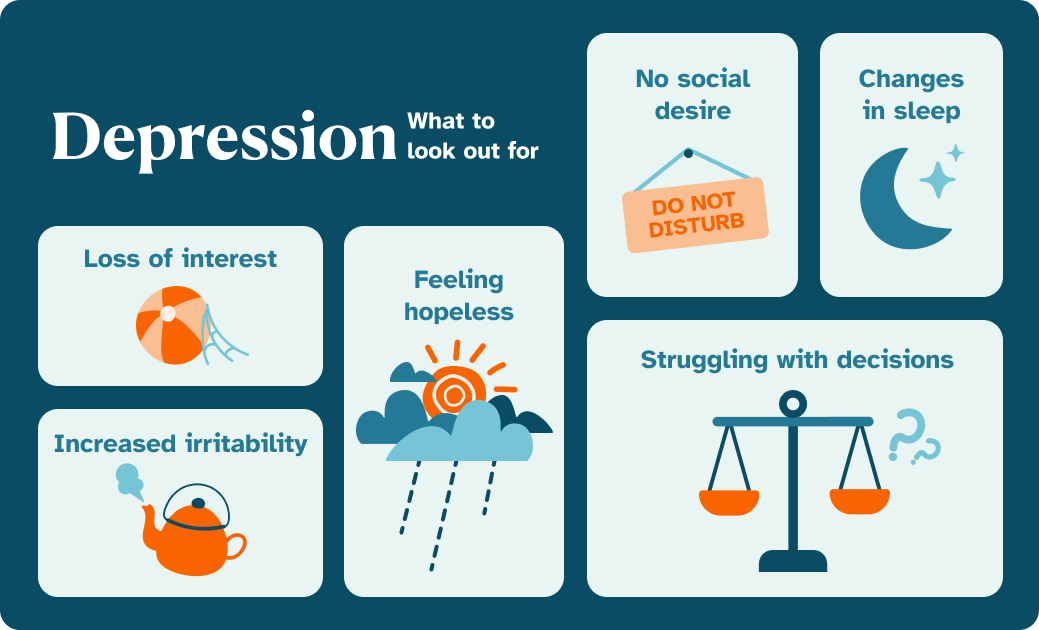

Mental Health as you Age: Understanding your Emotional Well-Being Later in Life
-
- October 15, 2025
- Whole Health
- 6 minute read
- Judith Ford, MD
As we take more trips around the sun, especially after turning 65, our mental and emotional needs can change. What doesn’t change, though? Your mental health being just as important as your physical health.
Because our mental health is mostly unseen, we may brush things aside or try to pin certain symptoms to a physical cause. Racing thoughts and worries may present as heart palpitations or a rapid heartbeat, so our first thought is often to schedule an appointment with a cardiologist.
Challenges like worry, loneliness, and grief are totally normal for older adults. However, if you’re experiencing ongoing anxiety and depression, take note—and take a next step to get help: these conditions are treatable, and support is available.
What Depression Can Look Like in Older Adults
It’s a different world than the one you grew up in, and mental health awareness has certainly come out of the dark corners and into the spotlight. But it’s not just a trend or a “young person’s problem.” Mental health challenges like depression and anxiety have existed as long as people have, affecting all ages.
However, the signs among those 65 and up are a little different, and may include the following:

Loss of interest in hobbies or social activities
Changes in appetite or sleep
Increased irritability or restlessness
Difficulty concentrating or making decisions
Feelings of hopelessness or worthlessness
Sometimes depression (whether you are experiencing only one of these symptoms, all of them, or different ones) is mistaken as a normal part of aging, but it's not. It's important to talk to your primary care provider or family doctor if these symptoms persist.
Understanding Anxiety in Older Adults
Turn on the news, scroll through social media and anxiety shows up. With modern technology has come a raised awareness of everything, everywhere, all at once. But anxiety that sticks around can start affecting your physical health, and it doesn’t have to be that way.
Like depression, anxiety may manifest differently as we get older. Here are some of the potential signs:

Constant or excessive worry, even about routine matters
Physical symptoms like muscle tension, headaches or stomach issues
Avoiding certain situations due to fear (i.e. I’m afraid I have cancer, so I’m not going to the doctor for my check-up, or I’m afraid I won’t be able to hear or see well, so I’m not going to my friend’s social event)
Difficulty sleeping or relaxing
Shortness of breath or rapid heartbeat
Anxiety can be linked to changes in healthcare, medications, or major life transitions.
How Mental Health Can Be Affected by Life Changes
There’s a reason depression and anxiety may spike in later life, and why the symptoms present themselves differently than younger adults.
While life changes for twenty-somethings like your adult kids or grandkids can be stressful (getting married, having a baby, buying a house), they’re also exciting and expected for that season of life.
But the life changes in the 65 and up crowd are a different kind of “firsts.”
First lifelong friend or sibling passes away. First time receiving a cancer diagnosis. First time not going back to work after a decades-long career ends in retirement. First time sleeping alone in your house after a spouse dies.
All of these transitions and changes are huge! And ongoing too: grief doesn’t go away overnight, chronic illness continues to impact your independence, and loneliness intensifies as time goes on. Understandably, your mental health takes a major hit.
You can’t avoid these events or the grief, adjustment, and stress that comes with them. But you can do something about the symptoms of anxiety or depression these life changes may intensify.
Staying proactive about your mental health
How small steps can make a big difference
The first step in getting help for normal mental health conditions like depression and anxiety is recognition, but self-awareness that leads to taking that first step is a big leap for many adults over 65.
You might think, “I’m not depressed, I’m just sad my best friend died,” or “I’m not anxious, I just worry about my kids and grandkids every waking minute of the day.”
Emotional well-being is just as critical as managing physical conditions. But until we recognize the way those conditions are impacting our entire well-being—physical, mental, spiritual, emotional—we probably won’t make the changes necessary.
There are small, simple ways to support your mental wellness every day and make the tiny changes that lead to bigger health gains. Spoiler alert—you might not need to take any pills!
That being said, medications are sometimes necessary, and they can be life-changing in many ways. Be sure to discuss your options with your doctor, and don’t rule out the possibility of seeking extra help in managing anxiety and depression that is impacting your quality of life.
With or without medications, prioritizing these simple, everyday steps towards better mental health can make a major difference:
Stay socially connected with friends, family, or community groups.
Keep a daily routine and include physical activity.
Try mindfulness practices or deep breathing exercises.
Seek out hobbies and creative outlets.
Talk to a counselor or therapist if you need support.
Good news! Many insurance plans, including Medicare Advantage, cover a variety of mental health services.
How ArchWell Health Can Help
You don’t have to navigate things on your own
Whatever happens next in your mental health journey, we’re here for you. Sit down, take a few deep breaths, and read these reminders to ground yourself in making mental health a priority in your 60s and beyond.
You deserve to feel well—mentally and emotionally—as you age.
Your care team at ArchWell Health is here to support your whole health—including your mental well-being.
Help is available, and it’s a sign of strength to ask for it.
Ask us about resources like wellness classes, social activities, and behavioral health referrals. Regular check-ins with your provider are a great place to start the conversation.
Pay attention to how you're feeling and don't hesitate to speak up.

About the Author
Judith Ford, MD, Chief Clinical Officer
Growing up with a father as a physician and a mother as a nurse, Judith Ford, a Medical Doctor (MD), has always had an interest in the medical field and caring for others. After attending college and medical school, she began practicing with a focus on taking care of older patients with complex conditions. With this mission in mind, the move to ArchWell Health was a natural fit. When not practicing medicine, she’s spending time with her husband, Chris, and her children, Sara and Jane.
Making Sense of Medicare Advantage
Choosing a Medicare plan can be confusing. Our Medicare Advantage 101 Guide breaks down the basics so you can feel confident about your coverage choices. Whether you're
new to Medicare or reviewing your options, this guide helps you understand what matters most during Annual Enrollment.